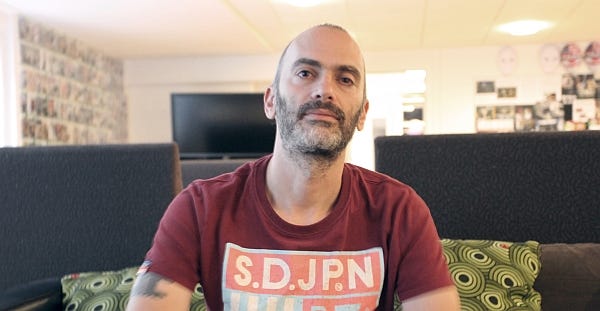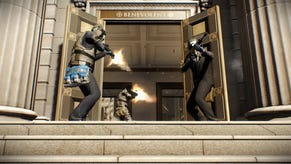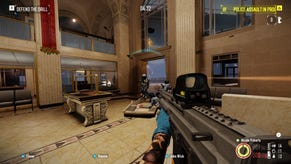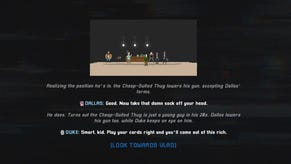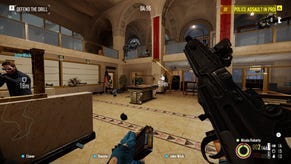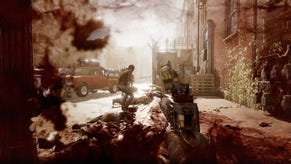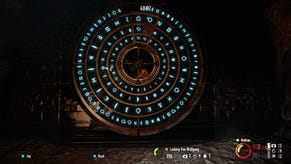Robber Man - Payday 2 Interview
Feisty Heist
David Goldfarb has a brilliant name. He's the game director of Payday 2, a very good game about being a horrible bank robber. It turns out everyone in the world enjoys being an awful person, because Payday 2 has remained near the very top of the Steam's sales charts since its release, while hovering in and around the top ten most played games list. I chatted to him about what it's like being a tiny studio with a huge hit.
RPS: Hello! You're very big right now. Well done. But with multiplayer shooters, things never stand still. What are you focusing on right now?
Goldfarb: In the beginning it was mostly stability and making sure the matchmaking worked. We had some ussues with Steam. Right now we have a separate track that's working on maps for the first upgrade or DLC. Then there's a lot of balance stuff. Then there's all the content stuff, like masks and that sort of stuff. The thing I'm currently dealing with is stealth and making that more consistent. So it feels like we're basically still just making the game.
RPS: I guess that's the nature of with digital distribution.
Goldfarb: Yeah. When I was doing Battlefield 3, I think we got the game out and then there were a couple of patches, but we didn't do ten in like two weeks.
RPS: Has that been affected by how big Payday 2 has become?
Goldfarb: It's partly that, and BF was much bigger than this. But with us, because we're such a small team, because we don't have the gating mechanisms that BF has, where you just can't get a patch out that fast and there's a zillion things that prevent that from happening, we're lucky that we can continue just relentlessly update. Whether it's good or bad for the people at the studios, it's generally good thing for the customers.
RPS: Did you expect to be as big as you are.
Goldfarb: Noooo. I mean, I had the same feeling when I was on Bad Company 2 that I had with Payday 2. That it was going to be a big success. I don't know why. I had this "here we go again" feeling, and I remember saying that. Even though I had the same vibe, I didn't realise we were going to do quite as well as we did on this game. I think we're all pleasantly surprised.
RPS: Where you are now, and where did you predict you would be? Is it a magnitude of size bigger?
Goldfarb: We're way past where we thought we would be. Way, way past. So far past that it's sort of hard to conceive that we're that far past it. At this point we're sort of like: "Well, okay. I guess that worked out. Where's it going to go from here?" We'd already made back our costs six days before we shipped. If you can imagine that's kind of how it's gone for the whole time we've been number one on Steam for three weeks, and now we're staying pretty steady at number two. So it's been incredibly successful for us already. And it seems like it's going to continue to be very successful.
RPS: Do you think the internet was starved for a good co-op shooter?
Goldfarb: Maybe they've played enough Left 4 Dead? To me, it's the high concept of a robbery game that's appealing to people. We imperfectly realised it in the first game, not that we perfectly realised it in the second game cause we definitely didn't. But I think we got closer to the fantasy in our heads. And I think we got closer to the fantasy in a lot of the consumer's heads.
RPS: It's kind of a dark fantasy, though.
Goldfarb: Yeah. Maybe fantasy's not the right way to put it. In the way that people watch Heat and think it would be cool to be the bad guy, I think there's an appeal, dark fantasy or not. And as weird as it is, there aren't a lot of games servicing it in the weird way we are. You're always the marine shooting guys for some reason or other, but you don't get to be this or do this thing co-operatively. So maybe it's hitting a vein that's been untapped.
RPS: And it's a co-op game, so even if it is a dark fantasy, you're almost admitting something to your friends.
Goldfarb: Yeah! But I think it's implicit that you are a bad guy. We're just more honest about it, maybe.
RPS: So you said you don't think you've done it perfectly this time around. What's missing?
Goldfarb: I don't know if it's missing. We'd have loved to have had more missions and big stuff. But those are things that we're planning to do the next year or so. We will be able to add all the things we would have shipped with if we had infinite time and resources. We're not a big studio, and there's only 30 of us, so we're trying to do everything at once. More heists and big heists are the two things that just jump out. Making sure things are as consistent as possible. There things I'd like to improve with stealth and some of the skills, are things we can do in the course of the next year, some of those things are for like Payday 3. And if you want to go way way out, there's lots of stuff you can talk about. Do we wanna add vehicles? Those sort of things. But they're like way far away, I think?
RPS: I was going to mention that transition between maps, and I was in a van and waiting to be part of a vehicle shootout, and then it just starts and you're on the ground. It felt like such a tease.
Goldfarb: I know! We've talked about it a lot, and you have to make decisions like: "We can't do it right now".
RPS: Are there technological issues? We're at the end of a console cycle and start of a new one. Pretty much everything you can do with them has been done. Does that stop you from doing things for the PC version that you could have done if you didn't have to worry about the consoles?
Goldfarb: I think doing stuff for consoles definitely makes things more difficult when you're blue-skying stuff, but I would say the reality was we have a finite amount of resources, we have three platforms to develop for, and doing stuff like vehicles is a huge chunk of work for us and would take away from aspects of the game that are maybe more important at the time. It was just a calculated decision: "If we do this, we're not going to hit our date or be happy with quality of the rest of the game." As painful as it was, because I'd loved to have done something, it was just a decision that we made to get to when we can do it right.
RPS: You ran a beta before it came out. What did you learn?
Goldfarb: That people get mad when you wipe their characters. That was one thing, but there was no way to avoid that because we made so many updates that it would've corrupted the save. But it still sucked. The stuff we learned was really invaluable. That stuff that we did for BF it was kind of a mixed bag because usually we were so close to the wire and it took so much time to get the changes done, that you knew shit was wrong that you couldn't do anything about. And with this team, we're small and very agile so the stuff that came out of the beta was huge in terms of what it would mean to the stability and long term-quality of the game. We got an enormous amount of really valuable feedback.
RPS: So it was mostly stability?
Goldfarb: It was stability, but it was also game balance, bugs, you know? There were things that we were like: "Shit, we should probably change this". You don't want to be led by a bunch of people asking for more, because I think that's a trap that a lot people fall into, but you also have to listen and be like: "Every single person doesn't like this."
RPS: Any examples of that?
Goldfarb: The most vocal objection was about Crime.net and the way that the hosting was at the time. And although we had a plan to deal with it, we couldn't go out and tell people we had this specific plan because we wanted to see how things worked. We had to go: "We have the solution, but we're not ready to deploy it."
RPS: Was the problem how people discovered games?
Goldfarb: There were several problems. There were problems that had to do with how we set-up our refreshing of the pool, which we patched to fix. There were problems like conceptually with how we expected things to work and how they worked in reality. If we wanted people to be able to host their games, we didn't want to turn it into just a server browser. It had to fit the fiction of the world and the idea that we had for Crime.net down the line, which was that it was sort of this biography of stuff that you could interact with. So we didn't want to, as much as people wanted, we didn't react and put a server browser in there because people want it. We know, but we had to sort of be thoughtful about the right way to do it. And it can be very difficult because people want what they want.
RPS: Do you think that you've fixed that? One of the things I found when I had to review it was that I didn't find the server browser particularly intuitive at all.
Goldfarb: I don't think it was intuitive. I would agree. It's been fixed to some extent, in that we've added filters for people, which was a big thing so you could actually filter for jobs and filter by difficulty and so forth. And that took away a good quantity of objection. And then we added the premium contracts, so now it costs a certain amount of money from out of your offshore account to host games [Craig's note: in-game cash], so that was something that's part of something bigger, but that was the first step. We're trying to use that money for all these other things that we're going to be adding. So I think it's better now. I'm not going to go out and say it's perfect, but the furore has died, and we've had positive feedback to those changes. I think, generally speaking, we're going in the right direction. It's always a scary thing to roll those things out and think: "I hope they don't burn down the house."
RPS: So, just thinking about the game as a whole and where you can go with it, did you ever think about letting players play as the police? Or is that too Left 4 Dead?
Goldfarb: We've talked about it, and I'm sure we'll continue to talk about it. The one thing, without going into too much detail, is we made a lot of decisions on this game that were ambitious and risky, and one of the reasons that we were able to get it out on time and make it generally a good game is that we didn't entertain a lot of stuff that was outside of our core focus, and the core focus is not versus. The core focus is co-op. So when we revisit whatever we're going to do for the next one maybe that'll change. When you make a versus game it puts you in a different place, and then your attention is kind of split. And having been on the Battlefield side of things, and we're doing SP and co-op, and multiplayer and they all kind of suffer in their own ways. It was good that we kept our focus and enabled us to finish this game. Now I'm not going say we would never consider it, but that's what we did on this one.
RPS: Speaking of Left 4 Dead: how did the crossover happen?
Goldfarb: I can't say. The story I heard is that the guys met at GDC.
RPS: Was there drinking involved?
Goldfarb: I would guess. But they hit it off, and they were like "Hey, why don't we do a crossover?" and I think they was a mutual agreement. And we just sort of did the Mercy Hospital stuff and Valve was super cool about it. And we will, I'm sure, we will be dong another thing, but I can't say what that is. Yet.
RPS: Speaking of Valve, they have the Steam Community now. I don't think Payday 2 has any mod tools or level editors.
Goldfarb: Not currently.
RPS: I was going to ask about why and how and...
Goldfarb: We will, I hope. We'll first, I think, release something for Workshop so people can release masks and stuff. But our timeline for that is uncertain because we have not that many people. So we're trying to kind of do that and hopefully down the line we can do stuff where we can maybe trade stuff and do economy stuff. That's definitely stuff that we think that's important and we really want to do, we're still in an all-hands-on-deck phase.
RPS: Would that include level-creation?
Goldfarb: I can't say about the level editor. We haven't really talked about releasing level-editing tools. I can't say about that, mostly because it's a proprietary engine and we'd have to do a bunch of stuff that maybe we don't want to do, but I think in general we're considering all those things, but I just can't tell you which way because I don't actually know what we're going to determine. We're definitely thinking about trading and making stuff for the game.
RPS: Thanks for your time.
